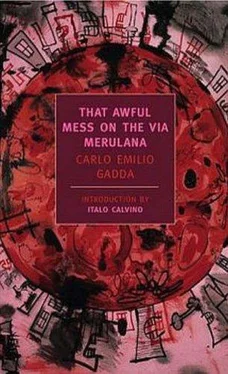For the 20th of February, Sunday, Feast of Sant'Eleu-terio, the Balduccis had invited him to dinner: "At half-past one, if that's convenient for you." It was, the signora said, "Remo's birthday"; and in fact, at the City Registry, Remo had been inscribed as "Remo Eleuterio," and baptized as such at the Church of San Martino ai Monti, so as to mark the day of his birth. "Two names that have a nasty ring to certain ears nowadays," {1}thought Don Ciccio, "both the first and the second." But for a guy like Balducci, who didn't give a damn about anything, they were a downright waste. The invitation, like the last time, had been issued by telephone two days ahead, a call "from outside" at the Collegio Romano Station, or rather, to give the street address, Santo Stefano del Cacco. First, in a melodious voice, the signora herself had spoken to him: "This is Liliana Balducci"; and then the old goat took over, Balducci, following up. Don Ciccio, after having kept the Sabbath with a visit to the barber's, took the signora a bottle of fresh oil from home. The Sunday dinner was happy, in the light of a marvelous afternoon, with confetti still littering the pavements, and an occasional carnival mask, a toy trumpet, an azure Cinderella or little devil in black velvet. The men talked about hunting: of expeditions and dogs: of guns: then about the comedian Petrolini: then about the various names they give the mullet all along the Tyrrhenian coast, from Ventimiglia to Cape Lilibeo: then the scandal of the day, Countess Pappalodoli, who had run off with a violinist; a Pole, naturally. Only seventeen. The story went on and on.
When he came in, Lulu, the little Pekinese bitch, a ball of fluff, had barked, and angrily, too; well, when she stopped growling, she had sniffed his shoes at length. The vitality of those little monsters is incredible. You feel like petting them, then stamping them. They were four at table: he, Don Ciccio, the husband and wife, and the niece. The niece, however, wasn't the same one as last time, that is to say on the Feast of San Francesco, this one was much younger, barely emerging from childhood. The other niece — the one on San Francesco's day — was only a niece after a manner of speaking: she looked like a peasant bride, her head crowned with black braids; strong and broad, she'd fill up a whole bed by herself: those eyes! and what a front! what a behind! Something to make you dream at night. This new one was a little girl with a pigtail hanging down her back, and she went to the sisters' school.
Don Ciccio, despite his somnolence, had a quick memory, infallible even: a pragmatic memory, he used to say. The maid, too, was a new face, though she vaguely resembled the first niece. They called her Tina. While she was serving, a wad of drained spinach deviated from the oval plate onto the candid whiteness of the immaculate tablecloth. "Assunta!" the signora cried. Assuntina looked at her. In that moment, both maid and mistress seemed extremely beautiful to Don Ciccio; the maid, harsher, had a severe, self-confident expression, a pair of steady, luminous eyes, two gems, a nose that made a straight line with the forehead: a Roman "virgin" of the age of Clelia; and the mistress, such a cordial manner, such a lofty tone, so nobly passionate, so melancholy! Her skin was enchanting. Looking at her guest, those deep eyes with a light of ancient nobility seemed to see, beyond the poor person of the "officer," all the poor dignity of a life! And she was rich, very rich, they said: her husband was well-off, traveled thirteen months the year, always tied up with those people up there in Vicenza. But she was even richer in her own right. To begin with, only real gents could afford to live in that huge building at number two hundred and nineteen: a few super high-class families, but above all people who were new to business, those who a few years ago had been called profiteers or "sharks."
And in the neighborhood the building itself was called by the poor people the palace of gold. Because it was as if the whole place right up to the roof were crammed with that precious metal. Inside, then, there were two staircases, A and B, with six floors and twelve tenants each, two per floor. But the triumph of it all was the third floor of stairway A, where on the one side lived the Balduccis, real class, and opposite the Balduccis there was a great lady, a Countess, also with a pile of money, a widow with a hard name to pronounce, Signora Menecacci, many cash, you might say, wherever you touched her there was a cache of gold, pearls, diamonds, all the most valuable stuff there is. And thousand-lire notes like butterflies: because money isn't safe in banks, you never know, and when you least expect it, they can catch on fire. So she had a dresser with a false bottom.
This, more or less, was the myth. The ears of Officer Ingravallo, which, under his crisp, black mop, rejoiced in a spring-like vitality, had seized it like that, in the air, like the ravings of ravens, or of Merulanian merli, after every whirring, from bough to bough of the spring. It was on every mouth, for that matter, and in every brain, one of those notions that become, thanks to a collective imagina-ion, compulsory, fixed ideas.
During the dinner Balducci had assumed, towards Gina, a paternal manner: "Ginetta, please, another drop of wine…" "Gina, fill the guest's glass.." "Gina, an ashtray…" like a good Papa; and she would answer promptly, "Yes, Uncle Remo." Signora Liliana then looked at her, content, almost with tenderness: as if she saw a flower, still closed, a little chilled by the dawn, now opening and shining before her eyes in the wonder of the daylight. The daylight was the male, baritonal voice of Balducci, the voice of the "father," and she, wife and bride of Papa, was therefore the Mamma. With great solicitude and a certain anxiety she followed the pretty hand of her still slightly hesitant ward in the act of pouring: glug, glug, golden Frascati, judging by the sound: the crystal decanter was heavy; the frail little arm seemed almost unable to hold it. Officer Ingravallo ate and drank soberly, as usual: but with a good appetite and a healthy thirst.
He didn't think, he didn't believe it opportune to think of asking anything, either about the new niece or the new maid. He tried to repress the admiration that Assunta aroused in him: a little like the strange fascination of the dazzling niece of the previous visit: a fascination, an authority wholly Latin and Sabellian, which made her well-suited to the ancient names, of ancient Latin warrior virgins or of not-reluctant wives once stolen by force at the Luper-cal, with the suggestion of hills and vineyards and harsh palaces, and with rites and the Pope in his coach, with the fine torches of Sant'Agnese in Agone and Santa Maria Portae Paradisi on Candlemas Day, and the blessing of the candles: a sense of the air of serene and distant days in Frascati or the valley of the Tiber, taken from the girls drawn by Pinelli among Piranesi's ruins, when the epheme-rides were heeded and the Church's calendars, and, in their vivid purple, all its high Princes. Like stupendous lobsters. The Princes of Holy Roman Apostolic Church. And in the center those eyes of Assunta's, that pride: as if she were denigrated by serving them at table. In the center… of the whole. . Ptolemaic system; yes, Ptolemaic. In the center, meaning no offense, that terrific behind.
He had to repress, repress. Assisted in this harsh necessity by the noble melancholy of Signora Liliana: whose gaze seemed to dismiss mysteriously every improper phantom, establishing for their souls a harmonious discipline, like music, that is: a texture of imagined architectures over the ambiguous derogations of the senses.
He, Ingravallo, was very polite, he was even a kindly uncle, with little Gina; from her throat, still rather long beneath her braid, came that little voice composed of yes and no, like the few, lamenting notes of a clarinet. He ignored, he chose to ignore, Assunta, after the maccheroni, as is only right in a guest who, also, has good manners. Signora Liliana, from time to time, might have been thought to sigh. Ingravallo noted that two or three times, in a whisper, she had said Hm. When hearts heave a sigh, then sorrow is nigh, as the saying goes. A strange sadness seemed to fill her face in the moments when she wasn't speaking or wasn't looking at the others at the table. Was she in the grip of some idea, some worry? concealed behind the curtain of her smiles, her polite attentions? and her talk, not studied or contrived, but yet always very courteous, as she adorned her guest with it? At those sighs, that way of passing a dish, those glances that sometimes wandered sadly off and seemed to breach a space or a time, unreal, only sensed by her, Ingravallo seemed little by little to take notice, to divine respective indications not so much of a basic disposition but of a present state of the spirit, a growing disheartenment. And then, a casual word or two, from Balducci himself: that hearty husband, all business deals and hares, now chatting so noisily, thanks to generous Frascatian inspiration.
Читать дальше












